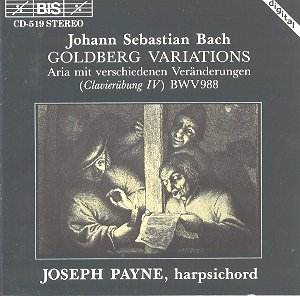JOHANN SEBASTIAN BACH (1685 - 1750)
Goldberg Variations, BWV 988 [77.40]
 Joseph Payne (Harpsichord)
Joseph Payne (Harpsichord)
Rec: December 1990.
 BIS-CD-519
[77.40]
BIS-CD-519
[77.40]
Crotchet
AmazonUK
AmazonUS
Amazon
recommendations

The Goldberg Variations, written late in Bach's life, is one of his
most popular keyboard works. Almost every pianist and harpsichordist records
this series of 30 variations framed by an aria and its da capo performance.
The long-standing myth states that Bach wrote this work for a Goldberg,
harpsichordist to Count Keyserling, who was insomniac. The variations were
to be played to help lull the Count to sleep. But it is difficult to sleep
when listening to this work, one of Bach's most complex pieces of music for
the harpsichord, and the most demanding. As Joseph Payne's excellent notes
to this recording state, this is 'one of the most formidable works ever written
for the keyboard.'
Like any recording of the Goldberg Variations, it is impossible to
judge it without considering those that have come before. From Glenn Gould's
famous recordings, through the excellent performances by Rosalyn Tureck,
up to the recent tour de force by Murray Perahia, most of the world's
great pianists have tried their hands at the Goldbergs. On harpsichord, some
of the best recordings are by Gustav Leonhardt, Kenneth Gilbert, Blandine
Verlet, Scott Ross, Pierre Hantaï, and the recording by Masaaki Suzuki
released by the same label, BIS.
One difference between piano and harpsichord recordings of the Goldbergs
is the choice of whether or not to play repeats. The score contains repeat
marks, which mean that each variation is played twice. On the piano, many
performers decide to drop some or all of the repeats, precisely because it
is difficult to make them sound different - what would be the point of playing
the repeats if it is only to play the same music twice. Yet, baroque performance
practice dictated that performers use the repeats to modify the music - adding
additional ornaments or embellishments.
This is where Joseph Payne comes in. I have listened to many recordings of
the Goldbergs, and have never heard any performer do what Payne has done.
Not only does he play all the repeats, not only does he add additional ornaments
when playing them, but he goes much further. It seems as though Payne has
appropriated the score and made it a combination of Bach's music and his
own improvisations. Many of the repeats, beginning with that in the first
part of the opening aria, contain runs and riffs that approach the astounding.
The only other recording I have heard where the performer has made this kind
of change is András Schiff's recording for piano. When listening to
it, I had the feeling that Schiff was not playing Bach; that he was reading
too much into the music. Listening to Payne brings on the same initial feelings,
but, after a few minutes, it all starts to make sense. His additions and
improvisations work; while sounding strange at first, they all fit in with
the tone and feeling he expresses through this recording, giving one of the
most individual Goldbergs I have ever heard.
Payne is equally at home in the fast variations as in the slower variations,
such as the opening aria, where he lets loose with some astounding runs during
the repeats, the canon of variation 6, and the essential variation 25, whose
plaintive melodies are masterfully embellished, and where Payne uses the
lute stop on one keyboard in the repeats to give it an incredible sound,
almost as though a lute were accompanying a harpsichord. I do feel that he
plays this variation a bit too fast, but the unique nature of his performance
overcomes this.
The faster variations, such as variation 16, the dazzling French overture
that opens the second half of the work, are played with mastery and verve.
Variation 29, with its succession of chords and runs up and down the keyboard,
is a virtuoso movement. Payne, here, gives this variation a great deal of
energy, although there seems to be a hint of hesitation at some points.
Payne also uses all the possible sounds of his instrument (a magnificent
copy of a Flemish harpsichord, by David Jacques Way, with two 8' manuals
and a 4' manual) to enhance the music, adding as much variety as possible.
The impeccable recording (as is often the case with recordings by BIS) adds
to the immense pleasure that this disc provides.
This is a unique, personal recording of the Goldberg Variations. While
much of what sets it apart is Joseph Payne's personal choice of ornamentation
and even improvisation, it deserves the highest recommendation for those
interested in hearing a different vision of the work.
Kirk McElhearn

